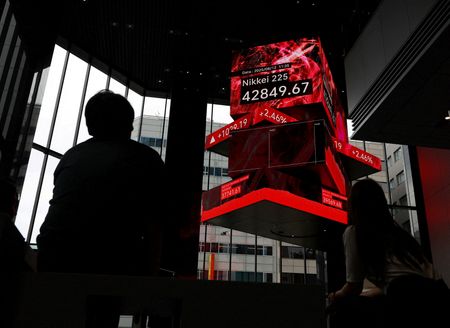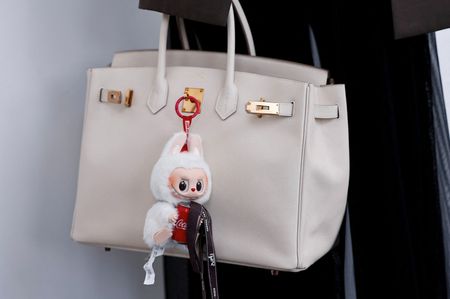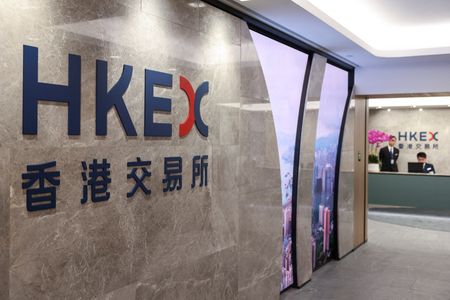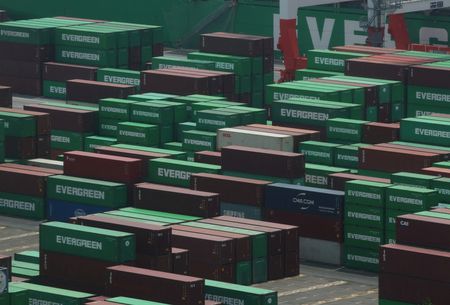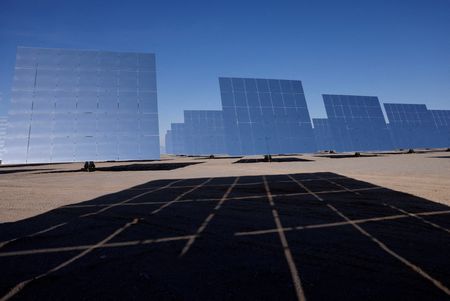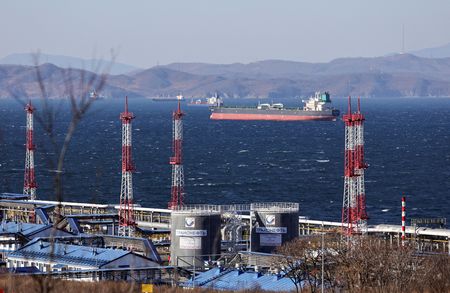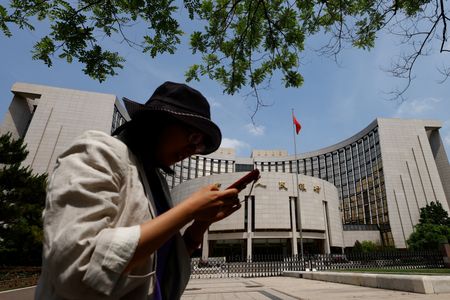By Rocky Swift
TOKYO (Reuters) -Japan’s Nikkei share average will likely ease off recent record highs toward year-end, according to strategists in a Reuters poll, though much depends on a fragile trade agreement with the United States.
Japan’s benchmark stocks index last week surpassed its previous intraday record, and traded as high as 43,876.42 this week.
The index is up more than 9% so far this year, but is forecast to slip back to 42,000 at the end of December, according to the median estimate of 18 analysts polled August 8-18.
The Nikkei joined global equity bourses in a steep dive in April after U.S. President Donald Trump announced sweeping tariffs on imports. As Trump backed down on deadlines and his administration worked out bilateral trade deals, many benchmarks recovered.
Japanese equities jumped around 11% after the U.S. agreed last month to reduce tariffs on Japanese auto imports to 15% from 27.5%, though a timeframe for the change and other details remain nebulous.
“The 15% tariff is relatively low compared to the one on China, so Japanese companies may be able to gain a competitive advantage,” said Masayuki Kubota, chief strategist at Rakuten Securities. “However, there is growing uncertainty about whether President Trump will actually uphold this agreement.”
Japan’s economy remains largely reliant on exports. Data last week showed that the country’s gross domestic product, the fourth biggest globally, grew much faster than expected in the second quarter.
GOVERNANCE PUSH
A major theme behind the Nikkei’s gains in recent years has been the Tokyo Stock Exchange’s push to boost corporate governance. Under pressure to improve returns and corporate value, companies have bought back shares in droves, and go-private deals have proliferated.
The Nikkei early last year finally broke through the key high of 38,957.44 that had stood since 1989 during Japan’s heady bubble economy. The gauge of blue-chip shares went on to set an intraday high of 42,426.77 on July 11, 2024, before the momentum petered out.
With the tariff turmoil diminishing and the domestic economy resilient, nine of 12 analysts in the Reuters poll expect Japanese corporate earnings to be higher in the second half of 2025 than the first.
“If the U.S. economy is solid, it becomes easier for Japanese firms to raise prices for their exported goods to cover the cost of the tariffs,” said Yugo Tsuboi, chief strategist at Daiwa Securities. “That will underpin corporate earnings.”
Median forecasts predict the Nikkei will trade at 43,000 by mid-2026 and 45,500 by end 2026.
Improving domestic wages, along with looser monetary policy by the U.S. Federal Reserve, will continue to make Japan a destination for foreign investors, said Oanda senior market analyst Kelvin Wong.
“An increase in global liquidity due to a weaker U.S. dollar and an impending dovish Fed pivot is likely to trigger a positive feedback loop back into the Japanese stock market,” said Wong.
BOJ AND POLITICS
Within the country, the major events investors are looking out for are a long-delayed rate hike by the Bank of Japan and the potential for political upheaval.
Prime Minister Shigeru Ishiba is under pressure to step aside after an electoral drubbing last month. Expectations that his replacement will be more fiscally expansive have added to tailwinds for stocks, said IG analyst Tony Sycamore.
“We do see the market continue to run higher into year-end, and then after that I’d expect to see a pullback as we get close to the BOJ rate-hiking cycle taking effect,” he added.
(Other stories from the Reuters Q3 global stock markets poll package)
(Reporting by Rocky Swift, Kevin Buckland and Junko Fujita; Additional reporting by Mayu Sakoda and Noriyuki Hirata; Polling by Aman Kumar Soni and Shaloo Shrivastava; Editing by Harikrishnan Nair and Christina Fincher)

